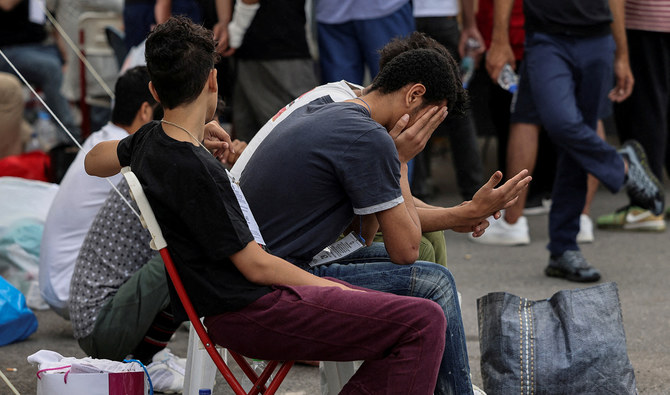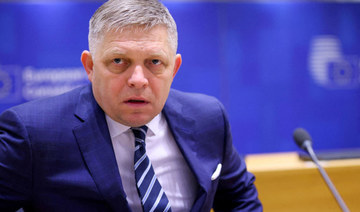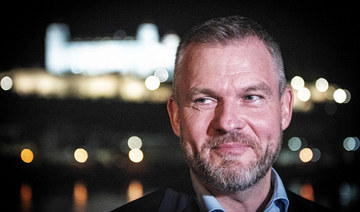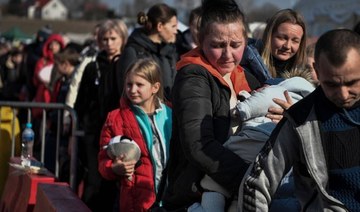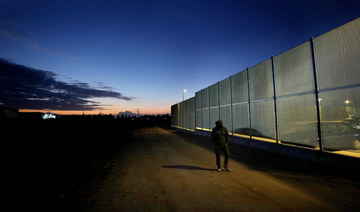ATHENS: Nine Egyptian men accused of belonging to a human smuggling ring that authorities say bears responsibility for one of the worst migrant shipwrecks in the Mediterranean Sea appeared in court in southern Greece on Tuesday for questioning over their alleged role in the disaster.
The nine face charges that include participation in a criminal organization, manslaughter and causing a shipwreck. The hearing was taking place in the southern city of Kalamata.
More than 500 people are believed to be missing from last week’s sinking of the dilapidated fishing trawler, which according to some estimates was carrying up to 750 people from Libya to Italy.
So far, 81 bodies have been recovered and 104 people, all men, have been rescued. A search and rescue operation continues in the area, but chances of locating more survivors were exceedingly slim.
Asked about the incident as World Refugee Day was marked across the globe Tuesday, European Commission President Ursula von der Leyen said: “It is horrible, what happened, and the more urgent is that we act.”
Von der Leyen, the head of the European Union's executive arm, said the EU should help African countries like Tunisia, where many migrants leave for Europe, to stabilize their economies, as well as finalize a long-awaited reform of the 27-nation bloc's asylum rules.
She did not, however, mention Libya, from where the doomed trawler and many similarly overloaded Europe-bound boats depart across the particularly dangerous Mediterranean migration route.
Nine Syrian and Pakistani survivors reportedly identified the suspects over the weekend as having been involved in sailing the ship.
Five other suspects were arrested in Pakistan, where police launched a crackdown this week on human smuggling after 12 Pakistani nationals were identified among the survivors, officials in Islamabad said Tuesday. Some of the suspects confessed to sending some of the Pakistanis who were on the sunken boat, they said.
Relatives of at least 124 people in Pakistan have contacted authorities to find out about missing loved ones believed to be on the trawler, the officials said. It is unclear how many Pakistanis were on the vessel.
Some survivors have said the trawler had been under tow by another vessel just before it sank. Greek officials have insisted the coast guard did not tow the migrant ship at any point, and only briefly had a line attached to it hours before it capsized and sank in international waters in the early hours of June 14.
The coast guard has also been widely criticized for not trying to rescue the migrants before their vessel sank. It argued that they refused any assistance and insisted on proceeding to Italy, adding that it would have been too dangerous to try and evacuate hundreds of unwilling people off an overcrowded ship.
The full details remain unclear. Photos and videos taken hours before the sinking show people crammed on all available open spaces of the trawler. Survivors have said the ship’s interior was also packed with people, including many women and children.
One survivor, Ali Sheikhi from the northeast Syrian town of Kobani, told Kurdish TV new channel Rudaw that he and other relatives from Kobani agreed to pay smugglers $4,000 each for the trip, a sum later increased to $4,500. His younger brother died in the shipwreck, he said.
Speaking late Sunday by phone from a closed reception center near Athens where survivors were taken, Sheikhi told the broadcaster the smugglers didn't allow anyone to bring life jackets and threw whatever food the passengers had into the sea.
He and his traveling companions were directed to the ship's hold, Sheikhi said, but he managed to get out onto the deck after paying extra money to the smugglers.
By the time the ship sank, they had been at sea for five days. Water ran out after a day and a half, and he said some passengers resorted to drinking seawater.
Crucially, Sheikhi said the trawler went down after its engine broke down and another vessel tried to tow it.
“In the pulling, (the trawler) sank,” he said. “We don’t know who it belonged to.” Similar claims have been made by other survivors in accounts posted on social media, and other survivors were anonymously quoted in Syrian media Monday saying the ship was being towed.
Most survivors have been transported to a migration center north of Athens, including 10 people who were released from hospital and transported to the center on Monday, Greece's Migration Ministry said. A hotline has also been set up for relatives seeking information on missing loved ones.



